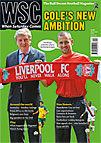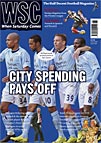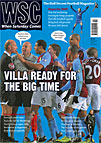 Twenty years of the Premier League
Twenty years of the Premier League
by Joe Lovejoy
Mainstream, £11.99
Reviewed by Joyce Woolridge
From WSC 304 June 2012
Buy this book
Joe Lovejoy seems to have set out to write an analysis of the circumstances surrounding the Premier League’s formation and of some of its biggest issues since then, notably foreign players, foreign managers, foreign owners, bungs and grasping agents. The decision to do this chiefly through the medium of long, undigested quotations from interviews with some of the main protagonists means that much of it reads more tediously than it should.
Slotted in between the often wearisome accounts of the machinations of Rick Parry et al are chapters that cast a cursory and abbreviated eye over some of the events on the pitch. “The Big Kick-Off” chapter compiles team lists of the original 22 clubs with a brief, phoned-in intro. This is not the only section that appears to be written almost in note form, but it is one of the more engaging, if you can put faces to the names. Ditto the hasty, often obvious assortment that is “My Top Twenty Matches” (seven of which feature Manchester United being thumped or throw- ing away leads). Spurs’ 2008 comeback 4-4 draw with Arsenal ends with the mystifying statement: “The rest is Lilywhite history.”
“Managers Who Have Won the Premier League” never strays from the perfunctory, as Lovejoy divulges that Alex Ferguson has “more silverware than H Samuel”, José Mourinho is a “Portuguese charmer” and “Monsieur Wenger polarises opinion”. Rather than reading “Twenty Headline Makers”, why not try to guess which major incidents make the cut. You will not go far wrong if you stick with Manchester United, though John Terry’s shagging is a surprise number one. Eric Cantona’s kung-fu assault is unaccountably missing.
If the interviews with players and Premier League worthies that make up the other chapters are also intended to leaven the pudding, you would have thought Alan (“The Geordie Legend”) Shearer should be last on the list. Though he does let slip that “We had a smashing team at Blackburn and we won the league”. “Journeyman goalkeeper” Kevin Poole is almost equally unenlightening, as are Niall Quinn, Stan Collymore, Ryan Giggs and Teddy Sheringham.
Sky Andrew, the agent, and Gordon Taylor offer some thought-provoking comments and the concluding chapters, where the main theme returns, have their moments despite appearing curiously rushed. Most interesting are the reflections on the Financial Fair Play rules and whether UEFA will be able and willing to enforce them. Even the author’s final conclusions about whether the Premier League has met its original objectives (“I don’t think so”) are terse.
Perhaps some space could have been freed up by trimming Gérard Houllier’s rambling foreword. The book would have been improved by some coverage of the events that disrupted the “predictability” of the Premier League, which is lamented throughout, such as Norwich and Villa’s title challenges. Although the preface claims the book is “the story of the Premier League’s first 20 years”, this odd mish-mash is anything but.
Buy this book
 Players used to keep themselves busy by swapping sports on a seasonal basis. Si Hawkins looks at why that’s no longer the case
Players used to keep themselves busy by swapping sports on a seasonal basis. Si Hawkins looks at why that’s no longer the case
 Twenty years of the Premier League
Twenty years of the Premier League
